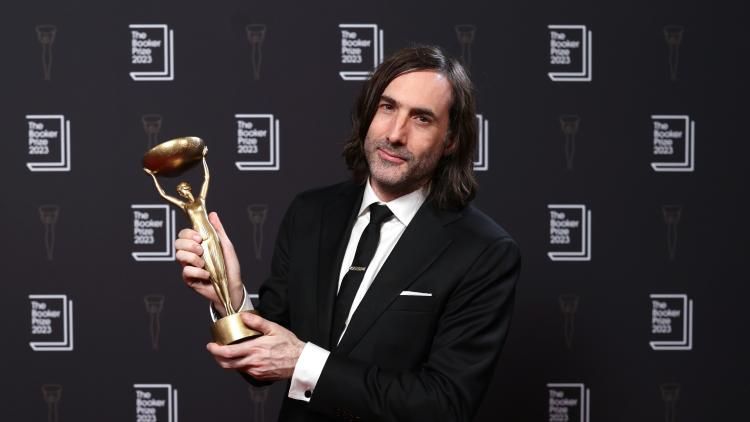
Everything you need to know about Prophet Song, winner of the Booker Prize 2023
As Paul Lynch becomes the fifth Irish writer to win the Booker Prize, here’s the lowdown on his winning novel, Prophet Song

From the Booker Prize Book Club to the Royal Family and the Irish government, Paul Lynch’s victory was celebrated far and wide, with many praising the novel’s timely and urgent messages
On Sunday, 26 November, the 2023 Booker Prize ceremony took place. This year’s awards were held at Old Billingsgate in London, a converted Victorian market on the banks of the Thames. The event took place at a slightly later time of year than usual, on a cold, wet night – though it certainly didn’t dampen the spirits of the attendees.
The evening celebrated the six books on the shortlist through a series of speeches, screenings, and readings. At around 9.50pm, in a speech by Chair of judges Esi Edugyan, Prophet Song by Paul Lynch was declared the winner. Lynch receives £50,000 in prize money and was presented with his trophy by last year’s winner, Shehan Karunatilaka.
‘With great vividness, Prophet Song captures the social and political anxieties of our current moment’, Esi Edugyan said, adding that ‘readers will find it soul-shattering and true, and will not soon forget its warnings’.
Lynch’s novel is set in a counterfactual Ireland – a country slowly sinking into totalitarian rule. As society collapses, a mother desperately attempts to hold her family together in impossible circumstances. Written without paragraph breaks, Prophet Song builds in tension, creating a sense of claustrophobia and panic.
Chair of judges Esi Edugyan, winner Paul Lynch and last year’s winner Shehan Karunatilaka, at the Booker Prize 2023 ceremony
© David Parry/Booker Prize FoundationThe novel was the bookmakers’ favourite, with Betway offering odds of 9/4, and the win makes Lynch the fifth Irish writer to take home the trophy, following in the footsteps of Anne Enright, Iris Murdoch, John Banville and Roddy Doyle. Lynch is the author of four previous novels, which have collected a host of awards, including the 2018 Kerry Group Irish Novel of the Year (for Grace) and the 2020 Ireland Francophonie Ambassadors’ Literary Award, and France’s bookseller prize, Prix Libr’à Nous for Best Foreign Novel (for The Black Snow).
On the night, thousands of listeners tuned in to the ceremony, which was broadcast live on BBC Radio 4’s Front Row. An official livestream of the event was hosted by ‘the internet’s resident librarian’, Jack Edwards, on both the Booker Prizes’ and Edwards’ own YouTube channels.
Following the winner’s announcement, viewers of the livestream on YouTube were quick to express their enthusiasm for Prophet Song. Mark Carolan said it was an ‘amazing book with a very important message’. Sean Warde called it ‘such a powerful and compelling novel’ and a ‘deserved winner’. Camille Houghton said, ‘this one blew me away’.
After the announcement, livestream host Jack Edwards discussed the result in the studio with The Booker Prize podcast’s co-host Jo Hamya and book blogger Eric Karl Anderson. While Anderson said the book was ‘challenging’ both stylistically and in its subject matter, he remarked that ‘it’s a very powerful novel’ and the reader is completely centred ‘in the life of the protagonist as her liberties are stripped away’. Hamya, who described the result as ‘joyous’, said the book ‘really isn’t so difficult once you realise you’re reading about war, and war isn’t supposed to be straightforward’, adding that ‘the emotional simplicity and the rawness of it is what makes it worth reading.’ Edwards agreed, and said the book ‘floored’ him, calling it a ‘real book for 2023’.
On Facebook, in the Booker Prize Book Club, a 6,000-strong community of book lovers and Booker Prize aficionados, member Lin Reilly called Prophet Song ‘an incredible book’ and said ‘it stays with you long after the last page’. Kenneth Williams declared it a ‘fantastic and utterly terrifying novel’, adding ‘we have a great winner in Prophet Song and [a novel] I will gladly recommend forever.’ While on the main Booker Prizes Facebook page, Elizabeth Hogan Webb observed that ‘Ireland is producing so much great writing these days’.
As the news began to spread. Leo Varadkar, the Taoiseach of Ireland (its head of government) offered his congratulations on X, acknowledging ‘a strong showing from Irish writers in the long and short lists’. He said it was ‘an incredible achievement for Paul and his book Prophet Song’.
Congratulations @paullynchwriter on winning the 2023 Booker Prize, after a strong showing from Irish writers in the long and short lists.
— Leo Varadkar (@LeoVaradkar) November 26, 2023
An incredible achievement for Paul and his book Prophet Song.
We’re delighted to announce that the winner of the #BookerPrize2023 is Prophet Song by Paul Lynch.
— The Booker Prizes (@TheBookerPrizes) November 26, 2023
Huge congratulations to @paullynchwriter. 🎉
Discover the book: https://t.co/o890YuwYOV pic.twitter.com/Z0Ab0eH3LU
The Royal Family also tweeted their good wishes to Paul Lynch, saying ‘Congratulations on your #BookerPrize2023 win, @paullynchwriter!’. This came after an event at Clarence House a few days earlier, where Her Majesty The Queen thanked Booker Prize authors past and present, who she said ‘enhance our life’ through their work.
By the morning after the winner ceremony, readers around the world were greeted with headlines about Prophet Song, and nowhere more so than in Ireland. The Irish Times rejoiced at ‘Paul Lynch’s home-grown success’, acknowledging the role of the Arts Council in supporting Lynch’s writing. The Irish Daily Mail playfully declared ‘Our Paul scoops The Booker Prize’.
While Lynch has stated that the Dublin-set Prophet Song is not a political novel, many observers have noted comparisons with the situations in Syria, Ukraine and Gaza, as well as much closer to home. Just days before Lynch’s victory, an attack outside a primary school in Dublin led to a night of far-right driven violence in the Irish capital, with an unprecedented number of riot police on the streets.
The similarities between those events and aspects of Prophet Song didn’t go unnoticed by the media. In The Conversation, Eve Patten, Professor of English at Trinity College Dublin, noted that ‘in the wake of last week’s riots in Dublin, the novel confirms unsettling truths about the nature of right-wing terror and the speed with which liberty and democracy can be torched’.
In the Guardian, Justine Jordan said that Prophet Song was ‘a novel written to jolt the reader awake’. ‘The judges have chosen perhaps the most timely and urgent book on the shortlist – a novel explicitly plugged into global strife and political tectonic forces,’ said the literary editor, adding ‘families like Eilish’s are suffering in Ukraine, Syria, Palestine and elsewhere, refugees fleeing political violence, women’s rights violated across the globe, and the far right on the rise in Europe.’
Ron Charles in the Washington Post wrote: ‘Maybe this dystopia is exactly what’s required to rattle us from complacency, from the comforting illusion that fascism only happens far away or long ago.’ Literary website Lit Hub called the winner ‘a 300-page panic attack’ adding ‘the register [Lynch] strikes is somewhere between the rising anxiety of classic noir (James M. Cain or Jim Thompson) and the high formalism of a McCarthy or a Woodrell. There’s not an ordinary sentence in the book’.
Geo News queried, ‘Did Paul Lynch get Booker Prize because his novel predicted Dublin riots?’ Yet Chair of judges Edugyan had already dismissed such claims at the ceremony’s press conference, stating the judges were guided by artistic merit. ‘One cannot let world events dictate what it is that one chooses as the best novel published in English that year,’ she said.
Booker Prize 2023 winner Paul Lynch with the Booker trophy, Iris
© David Parry/Booker Prize Foundation‘Fiction has the ability to bypass our self-defenses’, Booker Prize award winner Paul Lynchhttps://t.co/ca26v2eNgt
— Channel 4 News (@Channel4News) November 27, 2023
The undeniably timely nature of Prophet Song’s narrative, coupled with its Prize Booker endorsement, has quickly struck a chord with book buyers. By Monday lunchtime, Prophet Song had sold out on Amazon.com, after hitting the number two spot in the Bestsellers chart (sitting just behind the Guinness World Record 2024, a popular Christmas buy). All four formats of the book (paperback, hardback, ebook and audio) held spots one through four in the ‘Dystopian’ category, ahead of perennial bestseller Nineteen Eighty-Four. In Movers and Shakers (which illustrates the biggest gains in sales rank over the past 24 hours), Prophet Song was up 30,300%.
Juliet Mabey, publisher at Oneworld and Lynch’s editor, confirmed there would be a further print run of 50,000 hardbacks to meet demand, with an increased number of paperbacks to follow. If previous winners of the prize are anything to go by, it’s likely Prophet Song can expect close to a thousandfold increase in sales.
Of course, not everyone responded to the result with positivity. The Telegraph published an article headlined, ‘This year’s Booker winner is political fiction at its laziest’. In it, literary editor Cal Revely-Calder said: ‘There isn’t much to be gained from slamming morals upon the table’, calling the novel ‘overwritten’. In the i, Max Liu felt that the prize had gone to ‘the wrong Irish novel’, writing that it ‘shows us merely what we already know’ and ‘offers readers few surprises’. In the Times, Robbie Millen called the novel ‘a great flapping turkey’, going so far as to say it was ‘a knockoff Nineteen Eighty-Four’.
The evening following his win, Paul Lynch appeared on Channel 4 News, where presenter Krishnan Guru-Murthy asked him how he felt about the mixed reactions from literary critics. Lynch, who was a film critic before becoming a full-time novelist, simply shrugged and laughed. ‘I’ve won the Booker,’ he said. ‘Good night and good luck.’
Winner The Booker Prize 2023
